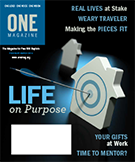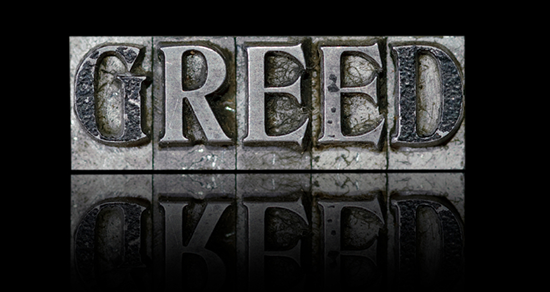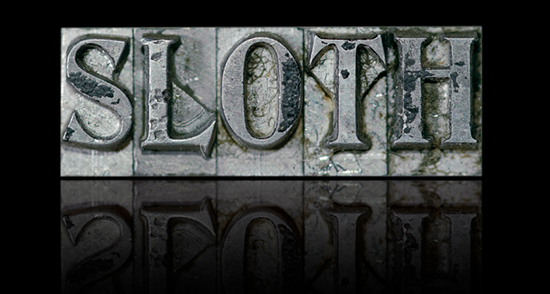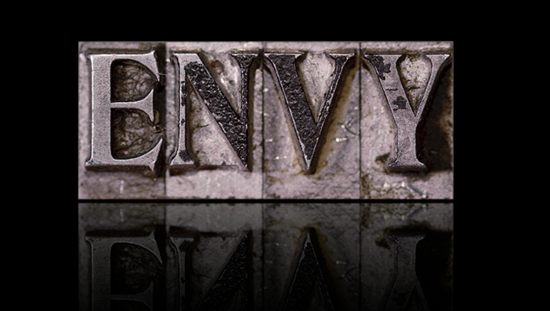
February-
March 2014
Life on Purpose
------------------
|

Money and the Seven Deadly Sins
by Brenda J. Evans
“Just before the Great Recession, the average American household owned 2.8 cars and had more television sets than people,” James Surowiecki stated in a recent The New Yorker article. By the way, we used those 2.8 cars only one hour a day.
What is it with us Americans and money—too wooed, too wasteful, too worried that someone will get ahead of us? Yes, I think so. But I also think there’s a bigger question. Are we sinning in our relationship to the things we own, lease, and long for? Maybe.
I’ve been thinking about the seven deadly sins lately, especially whether I’m sinning those sins. It started with a newspaper article. Then I saw paintings by Jamie Wyeth, youngest of the three Wyeth artists, who used sea gulls to depict the seven sins. Stunning. Finally, I came to David—yes, our David, the biblical, contradictory one who said, “The Lord is my rock, my fortress, my deliverer” out of one side of his mouth and “send for Bathsheba” out of the other. I am like him, of course, though I’m a peon and he was a king: child of Adam, child of God. Redeemed, but often lazy, lustful, greedy, gluttonous, vengeful, and proud. So are we all.
When it comes to money, the Seven Deadly Sins can overrun us like rogue elephants—fierce, muscular, formidable, destructive. We like money, long for it, and the elephants know it. Money gives us power, we believe, to rise above, look down on, take what we want, and do what we will.
Money seduces…tramples down reason and will. Don’t misunderstand. Money is not evil. If it lures us to sin or causes us ill, we allow it. Let’s take a look, be warned, and stay protected against the rampages of these rogue elephants.
Gluttony, the Sin of Excess
When we think there’s not enough, even though there is plenty, we are gluttonous for money. We gulp it down without thinking, swallow it without moderation or restraint. The signs are all over: over-indulgence, over-spending, over consumption. Shopping, grasping, hoarding. An insatiable appetite to get, have, keep. Gluttony puts desire above need. By impulse, we let the elephants in, or as Solomon says, weak-willed, we allow ourselves to be “broken into and left without walls” (Proverbs 25:28).

Sloth, the Sin of Indolence
I recently read Dr. L. C. Johnson’s message from Proverbs about a lion in the street. He was president of Welch College all those years ago, but I still hear his voice in my head, round, easy, and almost informal:
“Now, a lion is a dangerous animal. I think you know that. They are usually in cages, yet this one is out. But the sluggard, the lazy, or the indifferent man says, ‘Well, I will just turn over and pull the cover up over my head, go back to sleep, and let the lion go’.... But now, what would I do if there were a lion in my street? Well, I would try to find somebody who had experience in handling lions.”
The indolent man, as Dr. Johnson said so eloquently, does nothing. He does not act. He is a loafer, a slacker, a hanger-on, a man without discipline or diligence who doesn’t pull his own weight, even when he can, even when he knows to do good with himself, his talents, his money (James 4:17). He’s succumbed to the sin of sloth.
Greed, the Sin of Covetousness
Greed is a heart’s ache, an intense craving for stuff. It is a grubbing sin that God abhors (Psalm 10:3), forbids (Exodus 20:17), and punishes (Micah 2:3). This love of money is inconsistent with believers because it is characteristic of the wicked. Jesus said it originates in the heart and defiles us inside and out. Habakkuk says a greedy man, like Hell and death, is never satisfied. The love of it is the root of all evil, Paul says, and a sin that can cause a man to miss Heaven (Ephesians 5:5).
Paul gives an antidote to greed in 2 Corinthians 8: first give ourselves to the Lord, he says; then give ourselves to others; and finally give money, goods, or time for the relief of the saints. “See that you excel in this act of grace,” he exhorts. The joy of generosity can stanch greed.
Lust, the Sin of Obsession
Obsession for money begins as an intrusive desire that besieges us so intensely we allow it to capture and finally enslave us. This lust becomes what A. B. Simpson calls “a controlling principle of life.” Money—and what we think it will buy—becomes our end-all and be-all. Headlines affirm that American believers are particularly vulnerable to a money-power-sex cycle. Money ignites feelings of power, power touches off privilege, privilege sets fire to an I deserve attitude which implies all sorts of sexual and social rights, entitlements, and sins. A stubborn biblical constancy toward money snuffs this cycle at its beginning and keeps the elephants away.

Envy, the Sin of Discontent
Envy comes from the heart, according to Jesus (Mark 7:22), but is nurtured through our eyes, which Simon J. Kistemaker calls “the channels to man’s soul.” What we see fans discontent into bitterness, even hatred toward those who have what we do not, and so envy catches fire and burns on, consuming us inside out.
In Purgatorio, Dante suggested that we look too much. He and Virgil encountered the envious huddled together against boulders, their eyes sewn shut with iron threads. Not looking, not seeing, Dante implies, halts envy at the door. I believe he and Jesus would agree on three modern rules: don’t stroll the mall, don’t surf Internet sales sites, and don’t chase after the rich and famous. In other words, don’t look, and you will be able to stop the envy elephant at the door.
Wrath, the Sin of Rage
Money maven Warren Buffet says if you have an IQ of 25 or higher, all you need beyond that is “the temperament to control the urges that get people in trouble.” Rage over money is common. Fixation, fear, and regret whip us into a furor, sometimes against ourselves, sometimes against others. Maybe it’s loss aversion, in which the pain of loss is greater than the pleasure of gain.
Maybe it’s bad-buy or bad-sell decisions. Maybe we hold on too long or let go too soon. Maybe it’s over-confidence or believing the wrong advisor. Maybe our spouse spent too much. Whatever the cause, we’re angry! Evaluation of financial crises through the lens of rage rather the lens of common sense and biblical imperative is never wise. Keep rage away or make bad decisions worse.
Pride, the Sin of Self-Exaltation
Pride began with Satan and has marched unflinchingly through centuries of Scripture and history, straight into 2014. Humility is a lost virtue. Pride is alive and well. Yet pride is illusory. We actually believe the planet we walk on is ours (cattle, hills, soil, sky above, treasures below) and we are in charge.
Pride is delusional, too. We do not always know everything about everything, including how to best use our money. Regarding that, Dr. Terrance Odean, professor of finance at the Haas School of Business, University of California, Berkeley, says, “We all need a healthy dose of self-doubt and humility.”
Let’s acknowledge what is ours and what is not, what we can do and what we cannot. Let’s lose our pride. Admit our sins. Control our passions. Keep our hearts. Submit our wills. Speak our gratitude. When it comes to money and sin, we can keep those rampaging elephants out if we wish.
About the Writer: Brenda Evans is a retired English teacher. She and her husband Bill (former director of the Free Will Baptist Foundation) live in Cattletsburg, Kentucky. They are proud grandparents of seven.
|
|

